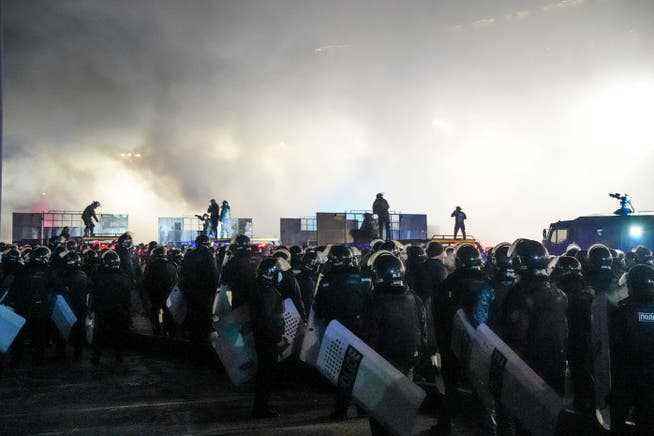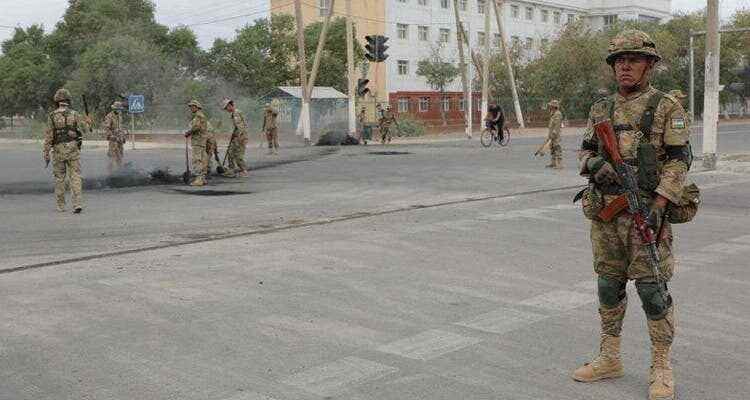The serious unrest in the Uzbek republic of Karakalpakstan came unexpectedly. Similar to the January turbulence in Kazakhstan, the causes lie deeper. This also shatters a few illusions about reform politics in Uzbekistan.
Uzbek security forces in the streets of Nukus on July 3. How big the violence was in the past few days is still unclear.
Dramatic images and videos of protesters and brutal police violence circulated on the Internet, reports of deaths and hundreds, perhaps even thousands, of injured people spread. What exactly happened in Karakalpakstan, the huge republic located in north-western Uzbekistan, during the mass demonstrations in the capital Nukus and other cities in the region since the end of June can hardly be reconstructed. The authorities announced on Monday that there were 18 dead and 243 injured. There is no independent confirmation of this.
popular anger quenched with violence
On the same day, the Uzbek parliament in the capital, Tashkent, voted to reverse the constitutional changes that had led to the mass uprising. As President Shawkat Mirsiyoyev announced at the weekend, Karakalpakstan should be allowed to retain its status as a sovereign republic. The crisis may thus have been politically defused for the time being. As far as news from the region cut off from the outside world is available, the merciless persecution of the demonstration participants and political activists began immediately after the suppression of the protests.
However, the totally unexpected explosion of popular anger points to deeper causes of discontent in Karakalpakstan. A big shadow also falls on Mirzijoyev’s policy, which is admired above all abroad. And last but not least, a comparison with the protests and riots in Kazakhstan in January suggests itself. Central Asia’s authoritarian systems of rule are reaching their limits, no matter how eager they are to present themselves to Western investors.
In Kazakhstan, at the beginning of the year, resentment was sparked by a thoughtless price increase for liquid gas, which is used for filling up, cooking and heating, particularly in the region on the Caspian Sea. Raw materials are mined there, but the residents of the region benefit little from the increase in prosperity. The protest later spread across the country and quickly took on a different, very political tinge. The Uzbek regime seems to have managed to prevent this.
Resource wealth in the poor region
In Karakalpakstan, the immediate cause of the uproar was political: the repeal of the region’s autonomy, at least formally enshrined in the constitution. But the tensions between periphery and center play an even more obvious role here: socio-economic, ethnic and cultural. Karakalpakstan, which makes up more than a third of Uzbekistan in terms of area, has been hit by the environmental disaster on the Aral Sea; It is extremely sparsely populated, characterized by desert and an inhospitable climate, and has therefore long been used by the Uzbek state as a prison location.
At the same time, it is Uzbekistan’s source of raw materials. Natural gas and numerous metals are produced in the region. For a long time, however, the Karakalpaks felt largely excluded from this wealth. The social, economic and health problems in the republic are great. Mirsiyoyev tried better develop the region economically, had infrastructure built, improve the quality of life and wants to attract investors. Karakalpak guest workers moved to Kazakhstan and Russia.
Ethnic-cultural differences also play a role: the Karakalpaks speak their own language, which was written down in Cyrillic as part of the Stalinist nationalities policy of the 1930s. The Uzbeks switched their language to the Latin alphabet more than a decade ago. Now the Karakalpaks should also join in. Dissatisfaction with this probably also fueled resentment at the abolition of autonomy, which was ultimately purely formal, as Central Asia expert Danil Kislow, who was born in Uzbekistan, said in an interview with the Russian online magazine Republic.ru.
He doubts that Mirsijoyev was completely unaware of what the constitutional amendment could trigger. The back and forth about sovereignty in the constitution shows how little it ultimately means. In addition, any oppositional, separatist-leaning tendency can now be mercilessly suppressed under the pretext of punishing the rebels and restoring stability.
According to Kislow, the question of autonomy has not played a political role in recent decades given the completely dried up political life in Uzbekistan; he considers the Karakalpak exile opposition to be insignificant. But now she is really being smothered. Also troubling for Tashkent is that Russia or Kazakhstan could make territorial claims to Karakalpakstan. Because the region did not belong to Uzbekistan from the start during the Soviet era.
Missing connection to the people
The protests on the periphery and their violent suppression show the limits of Mirsiyoyev, who is celebrated as a reformer. In Uzbekistan and Kazakhstan, the authoritarian rulers are unable to correctly assess the mood of the people and identify weak points in the system. There is a lack of honest feedback from administration and politics, where officials would rather flatter their superiors than confront them with reality.

In Kazakhstan, too, a price increase for liquid gas, which is used for filling up, cooking and heating, triggered serious unrest at the beginning of the year (picture from January 5).
Due to the curtailment of media freedom, the monitoring of the Internet and the control of social networks, society lacks outlets and the regime lacks feedback on the well-being of the population. At the same time, the officials are encountering a more demanding population in recent years, also thanks to Mirsijoyev’s opening steps and liberalization. However, this is only inadequately understood as a subject. Politicians suspect outside masterminds behind every unpleasant reaction.
The successes of Mirzijoyev’s reform policies primarily affected the economy and made the Central Asian country a highly praised location among foreign investors. However, with the example of the constitutional changes that got out of hand, some of the president’s claim for reform is proving to be an illusion. Economic and political opening cannot simply be separated. However, political changes always lagged behind economic ones.
The constitutional change is an expression of this reform policy, which primarily comes from above, from the President. If this gets out of hand, the stick is quickly at hand. As always in authoritarian systems, it is also about maintaining power. Karakalpakstan is a warning to Mirsiyoyev and his admirers.
